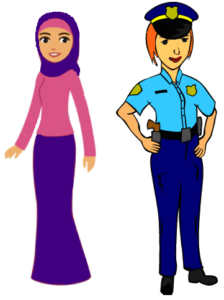I had a conversation this week and, in trying to make a point to the person with whom I was speaking, these two narratives popped into my head, almost fully formed before I even wrote them down:
| I am a Muslim. I love being a Muslim. So much of my identity is based in being a part of Islam. I love the camaraderie and fellowship of other Muslims. I make no apologies for that.
I understand that many people are afraid of me. That makes me sad, and, at times, very defensive, even angry. It is completely unfair that people assume all Muslims are bad because of the violent acts of a small minority of Muslims in the USA. The vast majority of Muslims are good people who care deeply about their communities, they want to contribute positively to such, and they want all people to live in peace. Yes, there are Muslims that do not respect human rights and that have done horrible, violent, reprehensible things in the USA, like:
But I should not have to publicly condemn such acts of violence over and over and over. The assumption shouldn’t be made that I support these events just because I’m a Muslim. We’ve seen social media posts and videos of Muslims, some of them considered leaders by other Muslims, celebrating or trying to justify these violent acts. But I shouldn’t have to apologize because an Iman with thousands of followers excuses or even promotes these violations of human rights. I want to be judged by my character and actions, not those of others. I’m proud of my hijab, and when you see me in it, please don’t automatically assume that I am a bad person and that I am your enemy. Please talk to me. Get to know me. I welcome the conversations. |
I am a police officer. I love being a police officer. So much of my identity is based in being a police officer. I love the camaraderie and fellowship of other officers. I make no apologies for that.
I understand that many people are afraid of me. That makes me sad, and, at times, very defensive, even angry. It is completely unfair that people assume all police officers are bad because of the violent acts of a small minority of police officers in the USA. The vast majority of police officers are good people who care deeply about their communities, they want to contribute positively to such, and they want all people to live in peace. Yes, there are police officers that do not respect human rights and that have done horrible, violent, reprehensible things in the USA, like:
But I should not have to publicly condemn such acts of violence over and over and over. The assumption shouldn’t be made that I support these events just because I’m a police officer. We’ve seen social media posts and videos of police officers, some of them considered leaders by other police, celebrating or trying to justify these violent acts. But I shouldn’t have to apologize because a police union with thousands of members excuses or even promotes these violations of human rights. I want to be judged by my character and actions, not those of others. I’m proud of my uniform, and when you see me in it, please don’t automatically assume that I am a bad person and that I am your enemy. Please talk to me. Get to know me. I welcome the conversations. |
These two groups are so similarly demonized, but I never realized it until the morning of the day I originally drafted this. Both of these groups can say the same thing, almost word-for-word, about how they are negatively perceived by many people.
There are going to be people who are going to read one column and totally agree – and read the other column and be outraged. There are those that believe all Muslims are potential terrorists because of the acts of a minority, but would never believe all police are potentially racist because of the acts of a minority of members. And vice versa.
If you read this and felt sympathy for one group, but not for the other, I hope you will think long and hard about why that is.
Comments are welcomed, unless such use what I consider misinformation or hate-based language.
Also see:
- Police: use social media to invite community participation, show compassion
- Citizens academy – intensive community engagement – my own largely positive experience with the Washington County Sheriff Department’s citizens academy.
- We need volunteer police officers – & an overhaul as well
- When “participatory” & “consultation” are just words
- List of my blogs related to conflict, free speech, reconciliation, etc.

